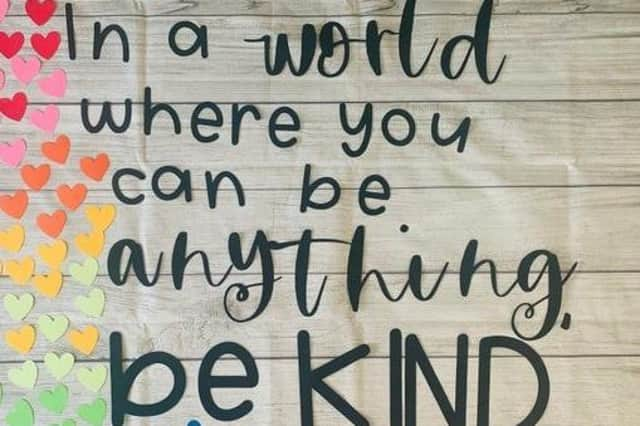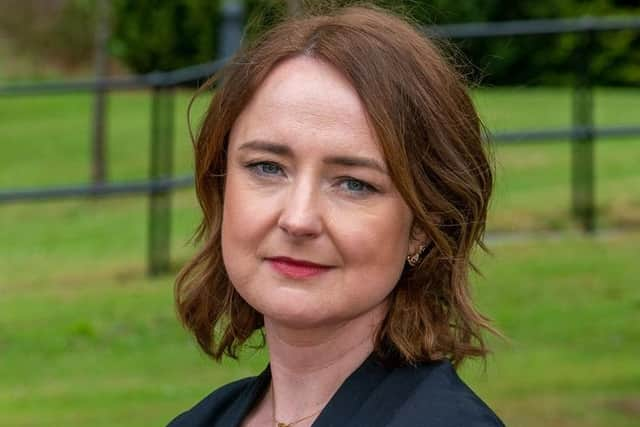If you want to be healthier and happier try being kind - say experts


According to Northern Ireland’s Mental Health Champion, Siobhan O’Neill, being kind or helping others is one of the crucial steps to psychological wellbeing.
The University of Ulster Professor of Mental Health Sciences explained that doing something good for someone else instead of focusing on our own egotistical concerns leads to a vital boost in self-esteem, an appreciation for being part of a community, and cultivating a sense of meaning and purpose in our lives.
Advertisement
Hide AdAdvertisement
Hide AdSiobhan said: “There’s a lot of strong evidence that showing kindness to others and giving back makes us feel better about ourselves. It’s good for our mental health because when we show kindness to others they are happy and that in turn has the reciprocal consequence of making us feel happy. When you ask people at the end of their lives what really mattered, they will say helping others close to them had the most significance.


“It’s also about gratitude - when we see that we have helped others we feel better about ourselves because we experience the other person’s gratitude towards our help.
“We are not designed to live alone, we are made to be part of a community, and kindness is central to maintaining the bonds between us.”
According to the Mental Health Foundation’s Kindness Guide (at mentalhealth.org.uk): “People who are kind and compassionate see clear benefits to their wellbeing and happiness. They may even live longer. Kindness can also help reduce stress and improve our emotional wellbeing.
Advertisement
Hide AdAdvertisement
Hide Ad“Now is the time to re-imagine a kinder society that better protects our mental health.
“Kindness could be built into business decisions, government policy and official systems in a way that supports everyone’s mental health and also reduces discrimination and inequality.-But that can start by individual commitments to showing kindness in our words and our actions.”
The Mental Health Foundation also advises that “kindness, or doing good, often means putting other people’s needs before our own. It could be by giving up our seat on a bus to someone who might need it more, or offering to make a cup of tea for someone at work. Helping others is thought to be one of the ways that people create, maintain, and strengthen their social connections.
“For example, volunteering and helping others can help us feel a sense of belonging, make new friends, and connect with our communities.
Advertisement
Hide AdAdvertisement
Hide Ad“Face-to-face activities such as volunteering at a food bank can also help reduce loneliness and isolation.”
Christian morality is of course predicated upon kindness, and the highest form of love as discussed in the Gospels is defined self-sacrifice; go to the Bible and altruism is consistently conceptualised as the cornerstone of righteous behaviour.
Jesus Christ continually associated loving your neighbour as yourself with the display of kindness, and repeatedly showed that putting the needs of others before our own was the path to salvation: ‘Do unto others as you would be done by’ is the pith of what he preached.
Throughout history, many great thinkers have inveighed us to be kind if we want to live in a better world. Indeed they have suggested that the ability to be kind is an indicator not only of enlightenment but also the path to true happiness.
Advertisement
Hide AdAdvertisement
Hide Ad“What wisdom can you find that is greater than kindness?,” asked the French philosopher Jean Jacques Rousseau; for Albert Einstein, “kindness, beauty and truth” lit up the world; “If you want to be happy, practice compassion,” said the Dalai Lama; “When words are both true and kind, they change the world,” said the Buddha.
The novelist Henry James said three things in human life are important: “The first is to be kind. The second is to be kind. And the third, is to be kind.”
“The best way to find yourself is to lose yourself in the service of others,” added Gandhi.
The Random Acts of Kindness Foundation (RAK) is a small nonprofit organisation based in Colorado and founded in the 1990s that invests time, expertise and resources into its mission, ‘Make Kindness the Norm’ (visit www.randomactsofkindness.org). It aims to promote kindness in schools, in workplaces and in communities by emphasising how it uplifts people, makes them happier, healthier, improves wellbeing and could change the way we live for the better.
Advertisement
Hide AdAdvertisement
Hide Ad“There are scientifically proven benefits of being kind,” said one of its ambassadors, assistant professor of psychology at Stanford University, Jamil Zaki. “The positive effects of kindness are experienced in the brain of everyone who witnessed the act, improving their mood and making them significantly more likely to “pay it forward.” This means one good deed in a crowded area can create a domino effect and improve the day of dozens of people.”
Further, studies show that witnessing acts of kindness produces oxytocin, occasionally referred to as the ‘love hormone’ which aids in lowering blood pressure and improving our overall heart-health. Oxytocin also increases our self-esteem and optimism, which is extra helpful when we’re anxious or shy in a social situation.
“About half of participants in one study reported that they felt stronger and more energetic after helping others; many also reported feeling calmer and less depressed, with increased feelings of self-worth,” observed Christine Carter, from UC Berkeley’s Greater Good Science Centre.
A 2010 Harvard Business School survey of happiness in 136 countries found that people who are altruistic — in this case, people who were generous financially, such as with charitable donations, were happiest overall; giving something back makes us feel better about ourselves.
Advertisement
Hide AdAdvertisement
Hide AdIn fact, “ giving help to others protects overall health twice as much as aspirin protects against heart disease,” says author Christine Carter in her book Raising Happiness. “People 55 and older who volunteer for two or more organisations have an impressive 44% lower likelihood of dying early, and that’s after sifting out every other contributing factor, including physical health, exercise, gender, habits like smoking, marital status and many more. This is a stronger effect than exercising four times a week or going to church.”
According to research from Emory University, when you are kind to another person, your brain’s pleasure and reward centres light up, as if you were the recipient of the good deed — not the giver. This phenomenon is called the “helper’s high.”
And like most medical antidepressants, kindness stimulates the production of serotonin. This feel-good chemical heals your wounds, calms you down, and makes you happy.
Engaging in acts of kindness produces endorphins, which are the brain’s natural painkiller. So being kind can not only grant you longevity but also reduce the brain’s perception of pain,
Advertisement
Hide AdAdvertisement
Hide AdAnd kindness helps redress stress: perpetually kind people have 23% less cortisol (the stress hormone) and age slower than the average population, according to research from the Integrative Psychological and Behavioural Science journal published in 1998. So too can kindness reduce anxiety, depression and high blood pressure, according to the Random Acts of Kindness Foundation.
A group of highly anxious individuals performed at least six acts of kindness a week. After one month, there was a significant increase in positive moods, relationship satisfaction and a decrease in social avoidance - according to a University of British Columbia Study. So, above all things, try being kind, because it really is revolutionary.
Comment Guidelines
National World encourages reader discussion on our stories. User feedback, insights and back-and-forth exchanges add a rich layer of context to reporting. Please review our Community Guidelines before commenting.